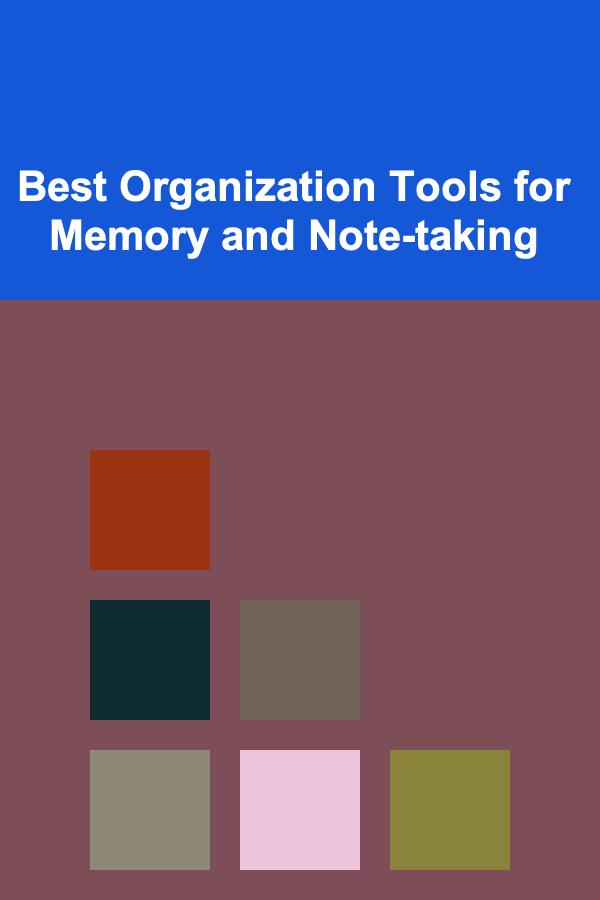
Best Organization Tools for Memory and Note-taking
ebook include PDF & Audio bundle (Micro Guide)
$12.99$8.99
Limited Time Offer! Order within the next:

In an increasingly fast-paced and information-heavy world, staying organized and retaining important information is more crucial than ever. Whether you're a student, a professional, or someone with a passion for lifelong learning, having a system in place for managing your memory and notes can enhance productivity, improve learning, and reduce the stress of forgotten ideas or missed deadlines.
The advancement of digital tools has greatly enhanced our ability to organize, store, and retrieve information. While traditional pen-and-paper methods still hold value for many, digital note-taking and memory organization tools offer powerful capabilities that make it easier to manage ideas, notes, and reminders. This article explores the best organization tools for memory and note-taking, providing an in-depth look at how these tools can transform your information management approach.
The Importance of Memory and Note-taking in Modern Life
Memory and note-taking are essential components of both learning and professional success. They help individuals to capture and retain information, enhancing recall and reducing cognitive load. Note-taking, in particular, aids in organizing thoughts, ideas, and resources, making them easier to access when needed.
For students, good note-taking skills are directly linked to academic success. By organizing lecture notes, readings, and assignments, students can review and reinforce learning more effectively. Similarly, professionals can use note-taking to manage tasks, track projects, and store important information for future reference.
Memory, on the other hand, serves as the cognitive framework through which we understand and make sense of the world. However, our memories are not infallible. The constant stream of information we encounter daily can overwhelm our cognitive capacity, making it harder to retain everything. This is where memory organization tools come into play---helping us store, organize, and recall information efficiently.
Challenges of Memory and Note-taking
While note-taking is an important skill, many struggle with maintaining an effective system for it. Common challenges include:
- Disorganization: Notes scattered across notebooks, devices, and apps can make it difficult to find information when it's needed.
- Inefficient Searching: As digital note-taking becomes more widespread, finding the right note quickly can be a frustrating task without proper tagging or categorization.
- Overload: With so many notes and pieces of information to keep track of, it can become overwhelming to know what's important and what's not.
- Memory Gaps: While taking notes helps to store information, the memory can fade over time without a proper system for review and reinforcement.
Thankfully, modern tools are designed to solve these problems by offering user-friendly features that improve the way we take notes, organize them, and retain information.
Key Features of Effective Note-taking and Memory Organization Tools
Before diving into the best tools, let's outline the key features that any effective memory and note-taking tool should offer:
- Searchability: The ability to search through notes quickly and find what you need.
- Tagging and Categorization: Organizing notes by topics, keywords, or themes for easier retrieval.
- Cloud Syncing: Syncing across multiple devices to ensure that notes are accessible anytime, anywhere.
- Collaboration: The ability to share and collaborate on notes with others, which is particularly important for group projects or brainstorming sessions.
- Multimedia Support: The ability to integrate images, audio recordings, links, and videos into your notes.
- Integration with Other Tools: Integration with other apps and platforms, like task management or calendar tools, to create a more cohesive workflow.
With these features in mind, let's explore some of the best tools for memory organization and note-taking.
Evernote
Overview:
Evernote is one of the most widely recognized and used note-taking apps globally. It offers a robust platform for organizing notes and information across a variety of devices, making it an ideal tool for individuals looking for an efficient, all-in-one note-taking solution.
Key Features:
- Multi-device Synchronization: Evernote syncs seamlessly across all devices, so notes are always accessible on your computer, phone, or tablet.
- Tagging and Notebooks: You can organize notes into notebooks and assign multiple tags to a single note for easy categorization and retrieval.
- Web Clipping: Evernote has a web clipper feature that allows you to save entire web pages or snippets of content to your notes, which is especially useful for research or gathering reference materials.
- Search Functionality: One of Evernote's standout features is its powerful search capability, which allows you to find notes by title, keyword, or even text within images.
- Task Management: You can integrate checklists and reminders directly within your notes, allowing you to use Evernote not only for note-taking but also for managing tasks.
Why It Works for Memory and Note-taking:
Evernote's combination of organizational features and flexibility makes it a top choice for memory and note management. The ability to create different notebooks for various topics, as well as the power to search through your notes, helps reduce the clutter of information and ensures you can access what you need with minimal effort.
Notion
Overview:
Notion has quickly become a favorite for those seeking a customizable workspace that combines note-taking, project management, and collaboration in one platform. It's particularly popular for users who appreciate a more visual and flexible approach to organizing notes and tasks.
Key Features:
- Customizable Workspace: Notion allows you to build your own workflows with databases, to-do lists, kanban boards, and more. You can create personalized dashboards tailored to your needs.
- Rich Content Support: You can integrate images, tables, videos, links, and other multimedia within your notes, making it easy to store all types of information in one place.
- Database Functionality: Notion allows you to create databases for more advanced categorization, enabling you to organize notes by categories, tags, and attributes.
- Collaboration Features: You can share your notes and pages with others, making it a powerful tool for team collaboration and group projects.
- Templates: Notion provides a vast library of templates for everything from note-taking and project management to habit tracking and goal setting.
Why It Works for Memory and Note-taking:
The level of customization offered by Notion makes it ideal for users who want to create an organized and personalized system for note-taking and memory management. Whether you're a student managing lecture notes or a professional organizing research and project details, Notion's flexibility allows you to create a system that works for you.
Microsoft OneNote
Overview:
Microsoft OneNote is a free, feature-rich note-taking application that integrates seamlessly with other Microsoft Office products. Its notebook-style structure and strong organizational tools make it a solid choice for anyone looking for an efficient way to take and organize notes.
Key Features:
- Notebooks and Sections: OneNote uses a hierarchical structure with notebooks, sections, and pages, providing an intuitive way to organize notes.
- Ink-to-Text Conversion: OneNote supports handwriting recognition, allowing users to convert handwritten notes into text---a valuable feature for users who prefer writing by hand.
- Multimedia Embedding: You can easily add images, audio, and video clips to your notes, making OneNote an excellent tool for capturing diverse types of information.
- Cross-device Synchronization: Like other modern tools, OneNote syncs across multiple devices, ensuring your notes are always available wherever you are.
- Integration with Microsoft Office: If you're already using Microsoft Office, OneNote integrates with other tools like Word, Excel, and Outlook, making it easier to connect your notes with other work-related documents.
Why It Works for Memory and Note-taking:
OneNote's intuitive structure and integration with the Microsoft ecosystem make it a strong contender for individuals who are already using Microsoft products. Its combination of multimedia support, organization features, and collaboration tools makes it a robust platform for capturing, storing, and recalling information.
Google Keep
Overview:
Google Keep is a simple, intuitive note-taking tool that integrates seamlessly with Google's suite of apps. It's ideal for users who want a lightweight note-taking app that's easy to use and syncs across all devices.
Key Features:
- Sticky Notes: Google Keep uses a simple, sticky-note approach, where each note is displayed on a colorful card. This minimalist design makes it easy to capture thoughts quickly.
- Reminders and Notifications: You can set time-based or location-based reminders for your notes, ensuring you stay on top of tasks.
- Voice Notes: Google Keep allows you to record voice memos, which is a convenient feature for users who want to capture information on the go.
- Collaboration: You can share your notes with others for collaborative note-taking and brainstorming.
- Integration with Google Services: Google Keep integrates seamlessly with Google Docs, Google Drive, and other Google Workspace apps, making it easy to access and work with your notes in various contexts.
Why It Works for Memory and Note-taking:
Google Keep is perfect for users who prefer simplicity and ease of use. Its integration with Google services and quick note-capturing features make it a great option for busy individuals who need to store ideas, to-do lists, and reminders on the fly.
Roam Research
Overview:
Roam Research is a unique note-taking tool designed to help users build a network of interconnected notes. It's ideal for those who want to create a knowledge graph, where each note links to others, enabling users to visualize connections between ideas.
Key Features:
- Bidirectional Linking: Roam Research's hallmark feature is its bidirectional linking, which allows you to link notes to each other. This creates a web of interconnected ideas, making it easier to explore relationships between concepts.
- Daily Notes: Roam encourages daily note-taking, where each day is automatically set up as a new page. This helps users build a consistent writing and thinking habit.
- Graph View: The graph view feature visualizes all your notes and their connections, providing an easy way to see how different pieces of information relate to each other.
- Markdown Support: Roam Research uses Markdown, making it easy to format and structure notes efficiently.
Why It Works for Memory and Note-taking:
Roam Research is perfect for users who want to build a dynamic, interconnected knowledge base. Whether you're a researcher, writer, or student, Roam's unique approach to note-taking and linking ideas can help enhance your memory and facilitate deep learning.
Conclusion
Choosing the right organization tool for memory and note-taking depends on your specific needs and preferences. Each of the tools mentioned---Evernote, Notion, Microsoft OneNote, Google Keep, and Roam Research---offers unique features that cater to different types of users. Whether you're looking for an all-in-one solution, a simple and intuitive platform, or a powerful tool for building interconnected knowledge, there's a tool for everyone.
By using these tools effectively, you can improve the way you capture, store, and retrieve information, leading to better memory retention, greater productivity, and more efficient learning. Ultimately, the key to success is finding a system that works for you and sticking with it to create lasting, organized memories.

How to Create a Dedicated Space for Group Fitness Classes
Read More
How to Make a Checklist for Preparing for In-Person Interviews
Read More
How to Use a Filing System for Easy Music Retrieval
Read More
How to Use Credit Wisely in Your Financial Plan
Read More
How to Utilize Vertical Space for DIY Tool Storage
Read More
How to Design a Biotope Aquarium for Native Fish
Read MoreOther Products

How to Create a Dedicated Space for Group Fitness Classes
Read More
How to Make a Checklist for Preparing for In-Person Interviews
Read More
How to Use a Filing System for Easy Music Retrieval
Read More
How to Use Credit Wisely in Your Financial Plan
Read More
How to Utilize Vertical Space for DIY Tool Storage
Read More